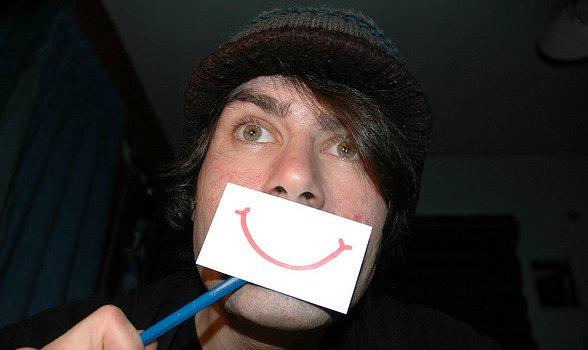
Credit: Flickr/Jason Rogers
Broken bones, pneumonia, and cancer all have outward signs of illness. Mental illness is often an invisible disease, but the pain that binds itself to us is no less great than those with physical ailments. The problem is that we don’t see it unless someone bursts out screaming in a public place at a person only they can see. Because its outward appearance is masked, it is easy to make the mistake of assuming someone is unburdened by injury or disease. Unfortunately, that assumption can be as damaging as the injury itself to those who are suffering.
The solution? Go into every interaction with every person knowing they are in the midst of fighting a battle known only to them. Be understanding of the consequences or your words, and try just a little harder to make sure what we say is what we actually mean.
***
“Why are you always so sad? Don’t you think it could be so much worse? You don’t realize how good you really have it.”
|
We often choose instead to put on a brave face and act like the “normal person” we can’t seem to find within ourselves.
|
These are natural human reactions to feelings of sadness, despair, loneliness, and depression. Humans love to make comparisons, judgments, and analogies based upon superficial information. Behavior like that is so ingrained into us by the time we reach adulthood that we rarely notice its prevalence. Judging others may in some way help us feel better about ourselves, but we rarely stop to ask what it means to the person we’ve judged.
“Smile, you are supposed to be having fun. You look so miserable.”
Sometimes we just don’t think before we speak. I’ve certainly been guilty of this transgression. Immediately after uttering the words, I typically knew the mistake I’d made. A seemingly innocuous statement like the one above says so much more than just “smile.” We aren’t photographers commanding children to put on their best fake grin for the camera. Someone who may be feeling depressed already knows they should be smiling and having fun. We know full well that many have it worse, or that we’re bringing others down by not showing outwardly that we’re enjoying the moment. We are simply powerless to avoid it. Pointing out the obvious will only make those feelings worse.
Instead of commanding a smile, we should ask: “Is everything alright?” It’s a seemingly similar question, but they’re actually worlds apart. While the answer may very well be “sure, everything is fine,” asking the question is powerful nonetheless.
***
People generally feel out of place around those who are upset or sad. It’s natural to gravitate to the happy and upbeat folks in our lives. Sadness is an uncomfortable emotion, and it’s only human to want others to escape that feeling. Will commanding someone to wear a deceitful smile make it any better for you? It won’t make us feel any better; depression just doesn’t work that way.
The feelings that come with depression are disheartening and infinitely painful and difficult for people to endure. Many struggle daily to hide what is going in in their heads. We often choose instead to put on a brave face and act like the “normal person” we can’t seem to find within ourselves. We hide our true nature for many reasons: shame, fear, and love among them. Occasionally, it just doesn’t work. Sometimes the sadness shows through despite our best efforts at concealment. One of the most hurtful things we hear during times like that is that we should be smiling and enjoying ourselves. It hurts because we can’t. Try to remember there is a tragic difference between the words “can’t” and “won’t.”
|
Facing the world becomes a herculean task and staying in bed becomes the right thing to do.
|
In addition to depression, many mental illnesses take a similar toll on those afflicted. Sometimes it’s just too hard to smile. There is too much going on, too much noise in your head, and too much pain to force something that is only disingenuous. When someone tells you that you are SUPPOSED to be having fun and that you SHOULD be smiling on one of those days, it only makes you want to retreat even more. Eventually, it just becomes too hard to go out. Facing the world becomes a herculean task and staying in bed becomes the right thing to do. Survival isn’t so much a question of making sure you have enough to eat and a safe shelter. Survival at that point becomes nothing more than a question of how much more burden you can bear to shoulder.
To place it in a different context, place yourself at the viewing of a close friend or family member. There are flowers placed strategically around the casket and their sweet smell permeates the air. There is music playing softly in the background, a classical concerto perhaps. You sit alone, off to the side of the room and feeling out of place. Uncomfortably you glance around at the people whispering quietly to one another. Conflicted between a sense of obligation to be there and an overwhelming urge to be anyplace else, you quietly hope you just blend in and go unnoticed. As someone strides over slowly and quietly, they place their hand on your shoulder and whisper to you. “Smile! At least it wasn’t you!”
Everyone will agree that the scenario in question is inappropriate and crass. No person able to read social cues would make such a heartless and unfeeling comment. It feels much the same when a depressed person is commanded to smile because another person thinks they should. No amount of cajoling, prodding, or badgering will make us feel as though we should smile either. Stop telling people what to do and start asking them why they do it.
|
These are the unknown missing. They are the people still alive but unable to thrive.
|
***
So many people with mental illness have become a silent and unseen part of humanity. We don’t think of the shut-ins who are unable to face the world without debilitating anxiety. We ignore the people who disappear from our lives and end up locked away in their homes and in their heads suffering from crushing despair. These are the unknown missing. They are the people still alive but unable to thrive. They need for us to reach out and at least attempt to understand the struggles they encounter every day. Finding a way to reach those people, to help them in some way needs to become a higher priority.
Bad things happen when mental illness goes untreated and people feel as though they’ve got nowhere to turn. Worse things happen when we decide to self medicate. The Internet is riddled with stories of people who do so with alcohol, drugs, reckless sexual behaviors and other highly addictive habits. As life spirals out of control, the euphoria that each offers presents an ever increasing pull until recovery seems almost out of the question. Reaching and recognizing people with mental illness before things begin to fall apart is the key to lessening its grip on those it ensnares.
Not a single person has gone untouched by mental illness. Whether we know it or not, some of our friends and family members struggle with it every day. Worse yet, an increasing number of teens and young adults struggle with the effects of mental illness without knowing there is a way out. Those kids struggle to deal with the stigma and pressure on a daily basis. Unfortunately, too many of them look to suicide as a way out. We all have to do a better job of recognizing the symptoms and reaching out to offer a helping hand. By lessening the stigma and increasing awareness and understanding we can make a difference. It’s time for us all to take a step forward and become a part of it.
The way forward is through authentic empathy and deep understanding. Not through forced smiles and hijacked emotions.
***
If you or someone you know is in a crisis right now, don’t wait. Call 1-800-273-8255 for the National Suicide Prevention Lifeline.
For more information and additional resources, or if you or someone you know is at risk, check out one of the links. It’s too important to keep quiet.
National Suicide Prevention Lifeline
Depression and Bipolar Alliance
This story first appeared at The Good Men Project.
Follow The Good Men Project on Facebook.







